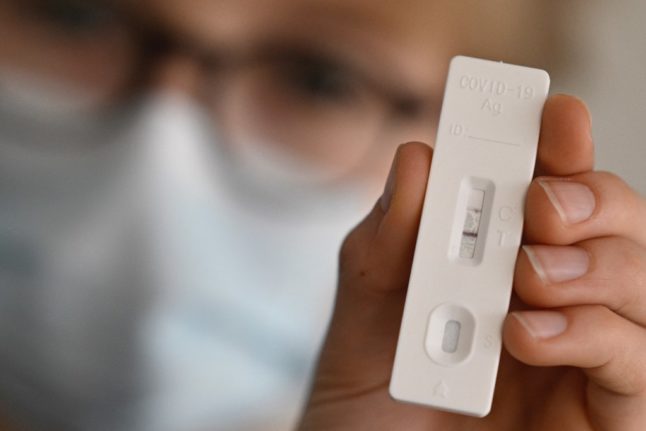Prime minister Jean Castex and health minister Olivier Véran held a press conference on Monday evening after a special meeting of the Defence Council, chaired by Emmanuel Macron.
Describing the health services as “under great pressure”, Castex announced the following extra measures:
- Indoor gatherings of more than 2,000 people are banned, and outdoor gatherings of more than 5,000 people.
- The closure of nightclubs, which has been in place since early December, has been prolonged.
- Most local authorities had already banned New Year’s Eve concerts and fireworks displays, but the ban on gatherings announced by Jean Castex on Monday evening also includes a ban on concerts with standing audiences.
- The consumption of food and drink is also banned in a number of venues where large groups gather, including at sports events and stadiums, in cinemas and concert halls and on all public transport, including long-distance trains.
- Table-seating only in cafés and bars
- For private gatherings on New Year’s Eve there are no extra restrictions, but the recommendations remain in place – keep gatherings small, ventilate rooms, where masks where possible and test in advance of the gathering.
- All ceremonies de vouex (New Year ceremonies held by local officials and some companies) will be cancelled
- From January 3rd, remote working will become compulsory for all workers who can, for a minimum of three days a week and a recommendation of four days a week.
Castex also announced that from Tuesday morning, people will be able to get a booster shot three months after their last vaccination rather than four months as was the case previously.
President Emmanuel Macron chaired a meeting – remotely from his holiday home on the French Riviera – of the Defence Council on Monday afternoon, at which new measures were agreed.
On Saturday, health officials recorded 104,611 cases over the previous 24 hours, the third consecutive day the numbers have been record highs.
Some of the increase could be accounted for by extra testing, as French people were advised to take precautionary tests before travelling to visit relatives or getting together with friends over the festive period, but the more contagious Omicron variant is becoming dominant across France.
Health minister Oliver Véran said that Covid case numbers are doubling every two days and warned of a “mega wave” when the fifth wave of cases of the Delta variant of the virus collides with the new wave of Omicron cases.
He said the government was considering changing the conditions of self-isolation for people infected with the Omicron variant, in order to avoid potentially “paralysing” services and businesses, but wanted more time to study international data. He said an announcement would be made on this probably after December 31st.
Hospitalisations are also rising with more more than 3,000 Covid patients now in intensive care, an indicator of increasing pressure on the health services.
Castex said that the “immense majority” of those hospitalised with the most severe form of the virus were either unvaccinated or not fully vaccinated.
Véran said that 190 children are currently hospitalised with Covid – 35 of them in intensive care – but added that every year thousands of children are hospitalised with common infections including gastro bugs and bronchitis.
He said: “Each year, bronchitis leads to the hospitalitation of 23,000 children. 14,000 children are admitted to hospital every year with gastroenteritis. There are more children at the moment in hospital with bronchitis than with a bad form of covid. Each year, there are on average 2-3000 children in ICU because of bronchitis.”
However, France has opened up vaccination to all children aged 5 and above.



 Please whitelist us to continue reading.
Please whitelist us to continue reading.
Sensible!
And finally some attention is given to consumption of food in public settings – this should have been forbidden from March 2020. I lost count of times where people would pretend to eat or drink on a train, so that they can keep their masks off for the entire journey.
Here in South Australia, it is a requirement to wear a mask in a cinema, unless eating or drinking. Have never seen so many people making their drinks and food last for the entire movie, just so they didn’t have to mask up. The pandemic has certainly highlighted how we don’t give a toss about anyone else, it is all about individual rights being asserted. We have become a world of, “I am alright, Jack’s”.
“I’m alright Jack” seems to be endemic in every country now.😡
When the booster was last reduced to 4 months, it was still only available after 3 Jan . Has that now changed ?
“President Emmanuel Macron chaired a meeting – remotely from his holiday home on the French Riviera”
So why didn’t he lead by example and stay in Paris. A bit like all the British that rushed to get here before the deadline, but hey, we just had to see our relations for Christmas and sod everybody else. What a selfish society it is now.
The British that ‘rushed here’ were all fully jabbed and tested – unlike many of the resident French population – so what’s your problem Boggy ? You need to make some New Year resolutions to help instil a bit more magnanimity !
Strange flex, given that France has a higher vaccination rate than Britain.
My problem is, why anyone with the slightest bit of intelligence would want to have holidays in the middle of a virus outbreak.